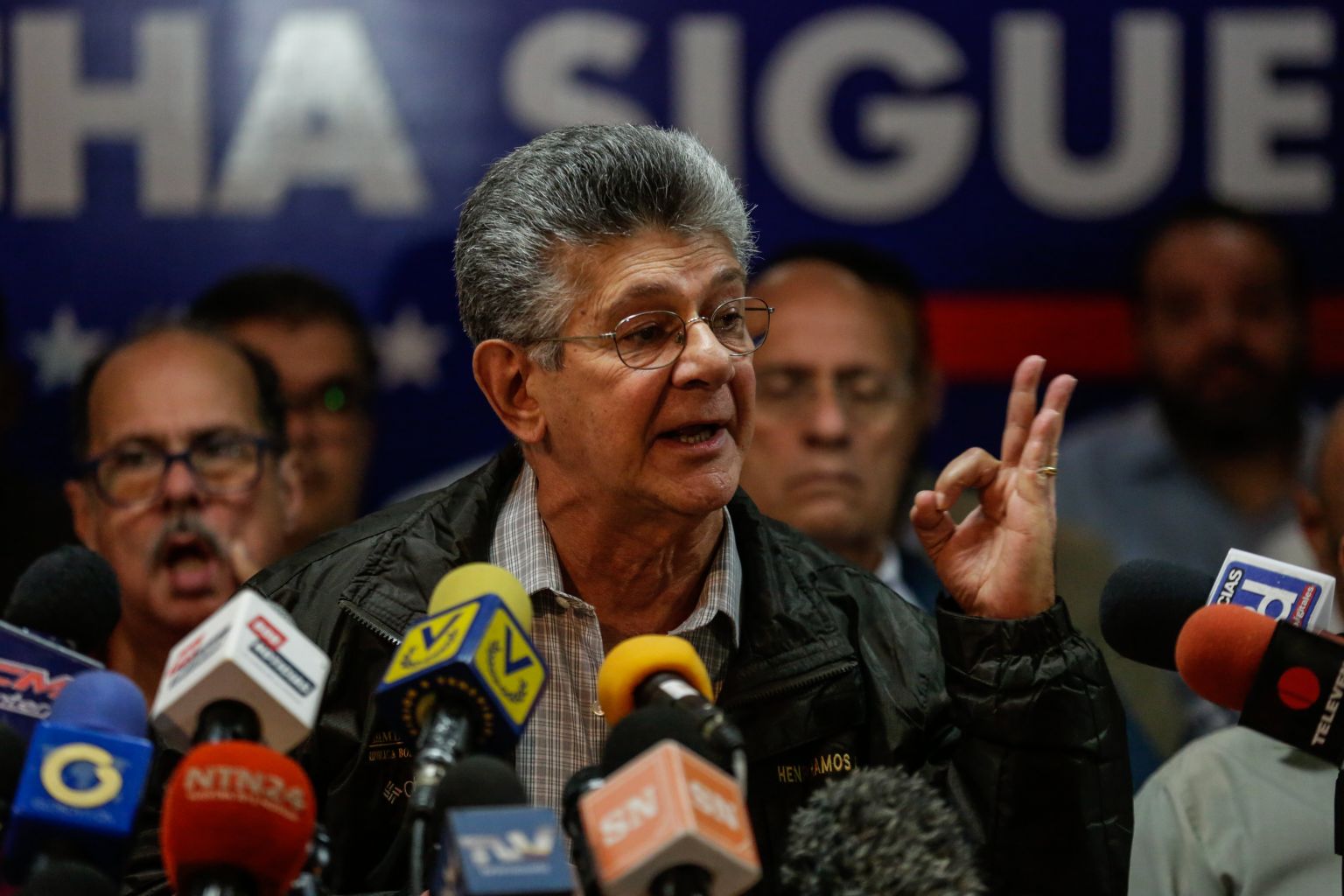Venezuela's pro-government assembly moves to take power from elected congress
Sign up now: Get ST's newsletters delivered to your inbox

National Assembly deputy Henry Ramos Allup takes part in a press conference in Caracas, Venezuela, Aug 17, 2017.
PHOTO: EPA
Follow topic:
CARACAS, Venezuela (WASHINGTON POST) - Venezuela's new pro-government Constituent Assembly formally moved on Friday (Aug 18) to assume the powers of the opposition-dominated congress, completing what critics call a power grab that effectively puts all branches of government under the control of President Nicolas Maduro.
The Constituent Assembly, created in a July 30 vote decried as fraud by the opposition and a host of nations, had begun to assume the role of the National Assembly, whose members were democratically elected in 2015.
But in a move likely to spark further international condemnations, the motion on Friday formalised the arrangement. The body was also poised to pass a new law that critics say could be used to punish opposition leaders and anti-government protesters with up to 25 years in prison.
The body had invited National Assembly members to attend Friday's session - an invitation that was declined.
Before the vote to assume their powers, the Constituent Assembly's president, Delcy Rodriguez - a top Maduro ally - theatrically pointed to the empty seats reserved for them.
"When they're called for national dialogue, cameras please, see? Empty seats. There's the definition of the Venezuelan right."
The opposition, which does not recognise the Constituent Assembly, rejected the move.
"All they want to do is keep stealing!" tweeted opposition legislator Juan Andres Mejia. "The world and Venezuelans have said it very clear. We DON'T recognise the fraudulent constituent national assembly."
Opposition leaders decried the vote as an attempt to finally "close" down congress.
Luis Almagro, secretary-general of the Organisation of American States, blasted the government, tweeting: "Fraudulent dissolution of the National Assembly by the Constituent Assembly deepens the coup d'etat in Venezuela."
But Diosdado Cabello, a senior member of Maduro's inner circle, said the decision had stopped short of disbanding congress, and that the Constituent Assembly was simply assuming congressional powers.
"For those raving, the constituent assembly has not eliminated the national assemble," Cabello tweeted. "It is only assuming the functions of those who have placed themselves on the margins of the constitution."
Nevertheless, Venezuela's congress appeared to be left in an even more precarious legal limbo.
The pro-government Supreme Court robbed the congress of its authority in March. Yet even after the new Constituent Assembly began to meet in its legislative palace this month, opposition lawmakers have continued to convene there in a separate chamber. It remained unclear whether opposition leaders could continue that arrangement.
Maduro - the anointed successor of Hugo Chavez, who died in 2013 - has billed the new Constituent Assembly as the cornerstone of his completing Chavez's socialist dream.
The assembly's members - ranging from student leaders to fishermen to top government officials - are being vested with vast powers to change the constitution, and will be used to streamline efforts to funnel more power and authority to local communities.
In practice, however, critics say, it will be used to consolidate Maduro's power and insure more political largesse in poor communities in exchange for their loyalty.
The moves by the Constituent Assembly come amid an escalating crackdown on dissent after four months of anti-government street protests have left more than 100 dead.
The Constituent Assembly moved on Thursday night to strip legislative immunity from German Ferrer, a member of the elected congress. It came as he and his wife, Luisa Ortega Diaz - Venezuela's former chief prosecutor who was removed from office this month - appeared to join a growing number of dissidents fleeing the country.
On Wednesday, the Supreme Court issued an arrest order for Ferrer. Both he and Ortega were previous government loyalists who turned against Maduro amid mounting allegations of human rights abuses and corruption. They had emerged as two of the most vocal and influential government critics.
Nicmer Evans, a political ally of the couple, told The Washington Post that they had left Venezuela.
Colombia's Radio Caracol reported on Friday that the couple had exited via Brazil and had arrived in Mexico, where Ortega was set to hold a conference call with a group of top prosecutors from across Latin America.
Marvelis Cuevas, Ortega's former spokeswoman, said she had "no idea" whether the couple had left the country.
Since the creation of Constituent Assembly last month, three opposition mayors have gone into hiding and two have fled the country, adding to a growing list of dissidents seeking to escape a broadening crackdown.
Addressing the increased targeting of dissenters, opposition lawmakers said in a statement that "Nicolas Maduro needs silence to consummate injustice. Any expression of the people's voice is being criminalised."
The arrest warrant for Ferrer was connected to government charges that had used his wife's former post to extort US$6 million from business executives. Ferrer has strongly denied the charges, describing them as political persecution.
In an interview with The Washington Post this month, Ortega denounced the creation of the new Constituent Assembly - members of which include Maduro's wife and son - as "the birth of a dictatorship."
"We are just a tiny sample of what comes to anyone who dares to oppose the totalitarian way of governing," she said. "I will continue fighting for Venezuelans, for their liberties and rights, until my last breath."

